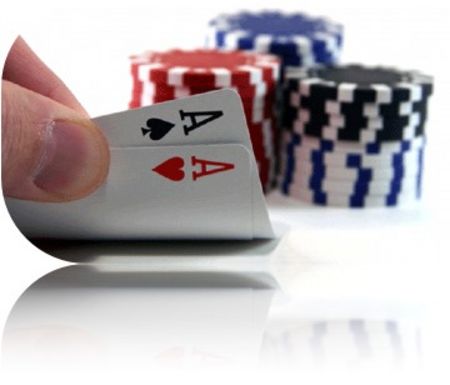Strength of Starting Cards

In the long run, everybody gets dealt the same starting hands on average. Winning
players play mostly strong hands while losing players play both strong and weak
hands. Playing the strong hands is easy. What is more difficult is folding those weak
hands that have a negative expectation. We will discuss the quality hands played in
each position. Be careful not to stray from these guidelines.
Position
In real estate, we all know the name of the game is location, location, location. In
Hold'em, the name of the game is position, position, position.
Position is important because it determines how much information you have about
how the hand is developing. In early position you have very little information about
what your opponents will do. While in lute position you already know what they
have done. For example, in late position you know if the pot has been raised and
how many opponents have entered the pot. This positional advantage also remains
the same throughout the hand, whereas, in a game like 7-card stud it might change.
Additional information from late position allows you to make better and more
profitable decisions. Sometimes you can use your position to win the entire pot. For
example, if everybody checks, you may have an opportunity to steal the pot.
Sometimes your position saves you bets that you would have otherwise invested.
For example, you hold JT with a flop of J74 against four opponents, if you are
acting first, you might bet out. If an opponent then raises and another reraise, you
will need to fold losing your bet. However, if you were in late position with the same
hand, you could safely fold if the pot is raised before you have to act. Your position
saves you a bet even though you have exactly the same hand.
Position is also helpful when you are on the river. Sometimes you are unsure
whether you should bet with a mediocre hand into your opponents, especially when
you are heads up. If you check the best hand, you lose an opportunity to gain a bet.
If you are acting last and your opponent checks, you usually can safely bet since
your opponent has indicated weakness.
There are many situations where your position will either save or gain you bets;
therefore, you can play more hands in late position than early position since each
particular starting hand has a higher expectation. Even pocket aces make more
money in late position than early position. You earn and save bets when acting last.
Learn this concept well as it is critical in Hold'em.
Number of Callers

The number of callers in a hand can have a big impact on your decision to play
certain hands. Small and medium pairs and suited connectors play best with many
opponents, while high unsuited cards play best against only one or two opponents.
For example, hands like AK and KQ play well against one or two opponents and
sometimes will even win with ace or king high. Against several opponents, you
usually need at least a pair to win and your pair may be vulnerable to opponents
hitting two pair or better. On the other hand, small pairs and suited connectors do
not improve very often to big hands, but when they do, you can often win a big pot
against several opponents. These hands need good implied odds to play, so they
are not profitable against one or two opponents.
Let's look at a common example of playing small pairs to demonstrate how the
number of players affects your pot odds and ability to play your hands. You
generally will need to fold small pairs on the flop unless you are able to hit a set,
which is 7.5 to 1 against improving: therefore, in a $10-$20 game you will play
between seven and eight hands on average before you hit your set and in the
process lose $10 each hand. Once you hit your set, you will need to win at least
$75 on average to compensate for all those times you had to fold on the flop.
If you are only against one or two opponents, it is difficult to win $75 on average
when there is only $20 or $30 in the pot. They might fold on the flop and you will
only win a small pot. Your set will also lose sometimes to higher sets, straights, and
flushes. Your wins need to be large enough to compensate for the occasional
losses and for the times you have to fold when you don't hit your set. You need a lot
of players in the hand to justify your odds. You can generally expect to make a
profit with at least five players in the hand, including the blinds, and possibly four
players if they don't play too well after the flop.
Type of Game (Loose/Tight, Passive/Aggressive)
The type of game criteria is related to the previous criteria of number of opponents.
The type of game gives you an indication of how many players will see the flop and
whether or not the pot might be raised.
I generally consider games where more than 30% of the players see the flop as a
loose game and less than 30% a tight game.
Internet Tip
In general, games on the Internet are tighter than the games you will find in typical casinos. There
are mote hands dealt per hour on the Internet than in a casino, so perhaps Internet players have a
little more patience to wait for better cards. Perhaps live players are there to gamble and have fun,
so they play a few more hands. Nevertheless, it is easy to see what kind of game you are playing on
the Internet since almost every site shows what percentage of players are seeing the flop.
Some games are aggressive where there is a lot of preflop raising while other
games are passive where usually you can see the flop for only one bet. Low-limit
games tend to be loose and passive while high-limit games tend to be tight and
aggressive. You will also find that some sites tend to be tighter than others are. For
example, my experience shows that the larger sites, such as Party Poker, have
tighter games than some of the smaller sites, such as True Poker and The Poker
Club. Smaller sites tend to have loose passive games.
The type of game criteria is used mainly by advanced players to play a few more
hands from early or middle position if the conditions are right. For; example, in a
loose/passive game, you might be able to call with a few more hands such as
suited connectors and small pairs. If the game is tight and aggressive, you might be
able to raise with more hands such as 77 or even KQ. These borderline plays
based on the type of game should usually only be tried by advanced players.
Raised/Unraised Pot
Many hands become unplayable when the pot is raised. This is a simple concept,
but many players fail to understand this very important point. A raise indicates that
your opponent has a strong hand and also lowers your pot odds. As a general rule,
you should not call a raise with speculative hand such as medium pairs or suited
connectors unless you expect to have at least five callers in the hand to justify your
odds. Of course there are exceptions but most players would not be giving up very
much if they always folded these hands to a raise.
Under the number of players criteria, we showed how small pairs should only be
played against many opponents; otherwise, you have poor pot odds
compared to the chance of improving your hand. If an opponent raises, your pot
odds are even worse. In a $10-$20 game, you will need to win at least $150 on
average to compensate for all the times that you have to fold your small pocket
pairs on the flop when you don't hit your set.
Hands like AT and KQ are also dangerous hands to play against a raise unless the
situation is just right. Most players raise with premium pairs and hands like AK and
AQ, so there is a good chance your hand is dominated. Be very selective in the
hands you play once the pot has been raised.
NEXT...Type of Opponents

